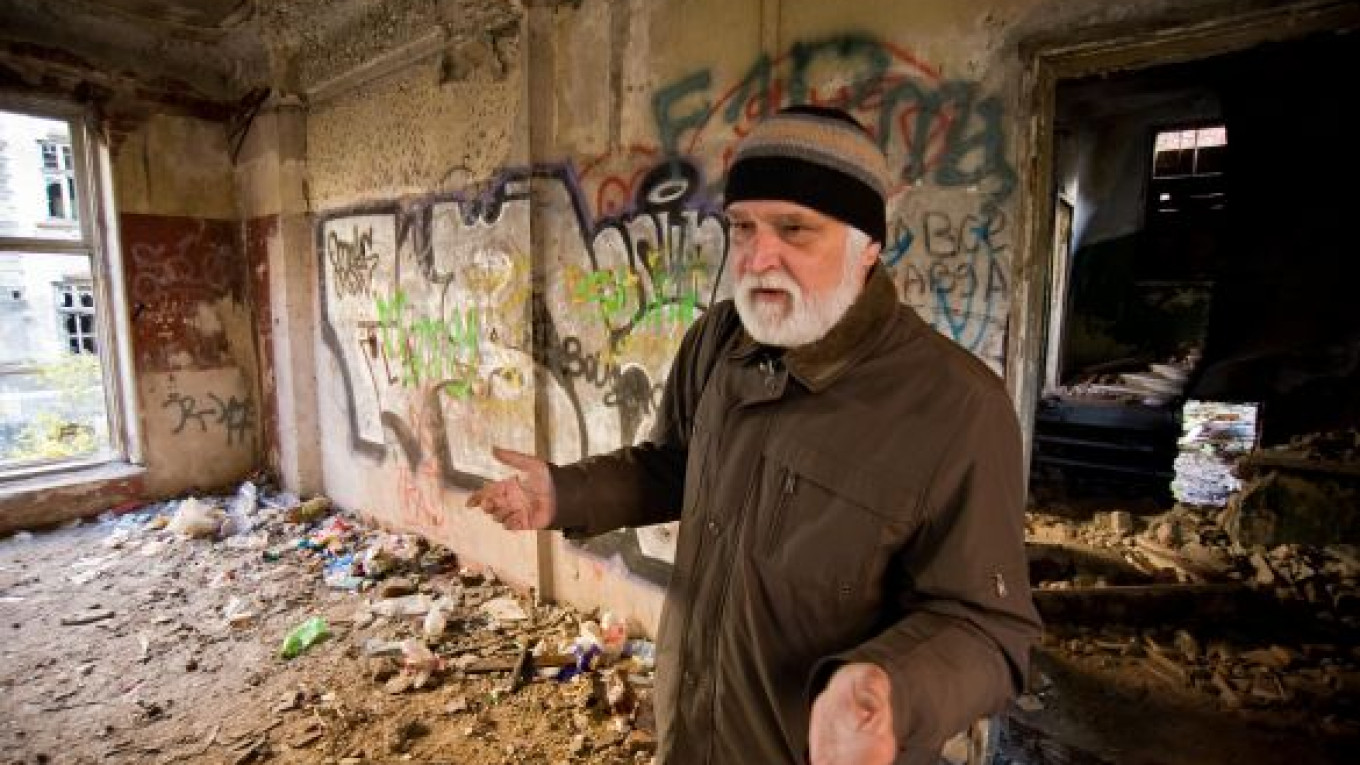Seven hundred years of Swedish, Russian and Finnish history is concentrated in these cramped quarters. But local preservationists say its unique architecture is in danger, and they are appealing to international organizations to intervene and protect the city’s Old Town.
Krepostnaya Ulitsa’s finest building is the Domus, a grand five-story structure, which was designed by Finnish architect Karl Hard af Segerstad in 1903. Most of the architecture in the Old Town is Finnish, a legacy of when Vyborg, as part of the Swedish and then the Russian Empire, was inhabited primarily by Finns.
The economic upswing in Russia in the last decade has seen a construction boom in the city, and older buildings are being replaced with more modern ones.
Nearly all of the houses in the Old Town are in shabby condition today. The Domus is in a state of dilapidation that not even the green safety netting that covers it can hide.
“I am ashamed for Russia,” said architect Viktor Dmitriyev, who blames the city government for not protecting the Old Town.
Dmitriyev worked for more than a decade at the State Preservation and Maintenance Office for Cultural and Historical Sites overseeing Vyborg, and he knows the Old Town better than anyone else.
Dmitriyev was asked to make an inventory of the Domus in 2004, after an investor appeared who was interested in the building, but it did not help save the structure’s precious interior.
“We noted down everything we found,” Dmitriyev said. “All the stoves, the cast-iron grills and the various details.”
When Dmitriyev visited the building later that year he found that many of the period details had been stolen, the city having failed to secure the building. The investor dropped out of the renovation project.
Last summer, the Domus was badly damaged in a fire. A flimsy safety net now hangs around the facade, and the doors are barred. Nevertheless, the building can easily be entered from the back. It is only when you are standing inside the house that you realize the magnitude of the disaster. The interior has been brutally vandalized: The old tile stoves are broken, the inner courtyard is reminiscent of a jungle, and the rooms are full of junk. Not surprisingly, the building has long been popular with both drug addicts and artistic photographers.
“The city sold the building to a private individual in October,” Dmitriyev said. “To this day, no one knows what the new plans [for the building] are.”
Activists say a major obstacle to preservation has been the short-term rents that the city offers. Contracts are valid for just 11 months, said Oleg Gardeyev, from the local residents association, meaning that there is no legal necessity for renters to restore buildings.
Dmitriyev is pessimistic, claiming that both the fire damage and vandalism have made it easier for the new owner to ignore such obligations.
“The city will probably propose that most of the items on the inventory be deleted,” Dmitriyev said. “Again it will ignore its responsibilities.”
And he is pessimistic about the future of the Old Town as well, calling on international organizations to put pressure on the city government and to offer help.
“The city doesn’t have the necessary skills to handle the challenge [of adequate restoration],” Dmitriyev said, asking for international organizations to play a role in saving the medieval gem.
There is a precedent. The World Monuments Fund put Vyborg’s municipal library — built by architect Alvar Aalto, the “father of modernism,” in 1927 — on its endangered list in 2000, and today the building is in a much better state.
A Message from The Moscow Times:
Dear readers,
We are facing unprecedented challenges. Russia's Prosecutor General's Office has designated The Moscow Times as an "undesirable" organization, criminalizing our work and putting our staff at risk of prosecution. This follows our earlier unjust labeling as a "foreign agent."
These actions are direct attempts to silence independent journalism in Russia. The authorities claim our work "discredits the decisions of the Russian leadership." We see things differently: we strive to provide accurate, unbiased reporting on Russia.
We, the journalists of The Moscow Times, refuse to be silenced. But to continue our work, we need your help.
Your support, no matter how small, makes a world of difference. If you can, please support us monthly starting from just $2. It's quick to set up, and every contribution makes a significant impact.
By supporting The Moscow Times, you're defending open, independent journalism in the face of repression. Thank you for standing with us.
Remind me later.


